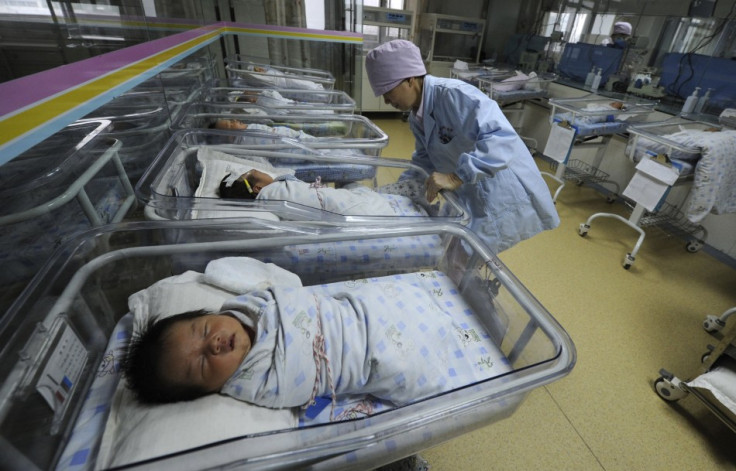China to End One-Child Policy Due to Aging Crisis

Chinese authorities have said they are considering lifting their controversial one-child policy by the end of 2015, according to reports.
State news agency Xinhua has said the country will look to relax the law which has been in place since 1978 to allow couples to have a second child if either parent is the only child by the end of the year.
Currently, both parents must be sole children to be eligible for a second child.
The new law could be extended to allow all families to have a second child by 2015. China previously relaxed the policy to allow rural couples a second child if their first offspring was a girl.
Mao Qun'an, director of the propaganda office at the National Health and Family Planning Commission, told Xinhua: "Our commission is organizing research on the size, quality, structure and distribution of the population so that we can propose plans to improve the policy.
"We'll have to move cautiously and coordinate between current situations and long-term objectives.
Government researchers urged the nation to review the county's one-child policy to cope with an aging population and labour shortages.
The county's ageing population means the number of people aged 65 and above is predicted to reach 29% by 2050 - up from 9% in 2011.
Last year China's working population fell for the first time in decades as a result of the one-child policy.
"China's one-child policy could be eased around end-2013. We believe that the reform-minded president Xi and premier Li will use the opportunity of abolishing the one-child policy to build up their authority, show their determination in making changes and convince the Chinese people that they do have a roadmap for reforms," said Ting Lu and Xiaojia Zhi, China economists at Bank of America Merrill Lynch (BoFAML).
BoFAML estimates more than two 9.5 million babies could be born if the policy was relaxed on top of the 16 million a year born in the mainland every year.
The policy has always had some grey areas in terms of its strictness. As well as allowing farmers to have a second child as an additionm to their daughter, many of the rising middle class families in the country simply pay a fine if found to have a second child. Some cities such as Shanghai barely enforce the law due to falling fertility rates.
The policy has resulted in hundreds of millions of abortions and sterilisations in the country. Recently photos of a woman lying next to a near-fully developed baby after she was forced to have an abortion after being seven months pregnant caused outrage in the country.
The woman was forced to terminate her pregnancy after she she could not pay the 40,000 yuan (£4,000) fine for having a second child. The fine is 20 times the average annual wage of a rural worker in China.
The government says the policy has prevented an additional 400 million births in the world's most populous country of 1.3 billion. China's population is estimated to hit 1.4 billion by 2020.
© Copyright IBTimes 2025. All rights reserved.






















